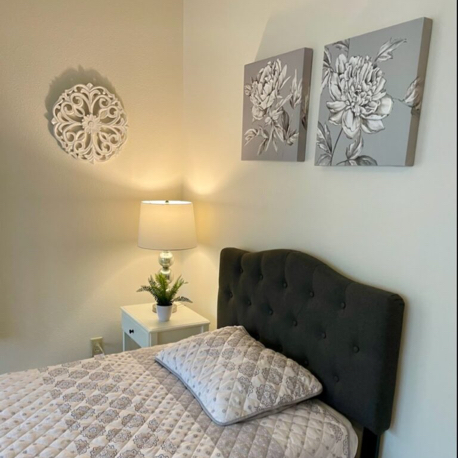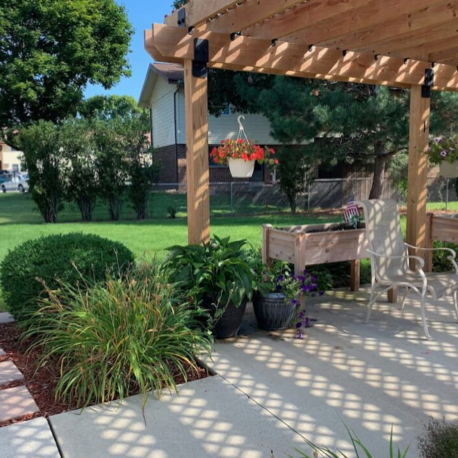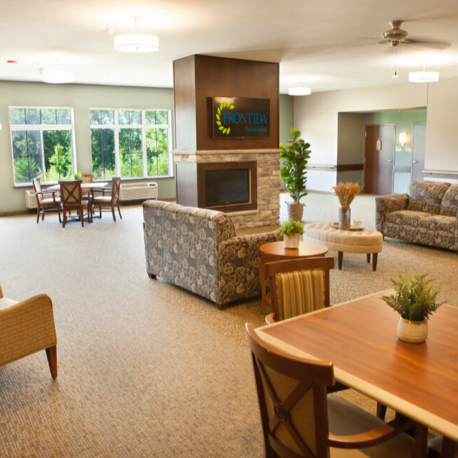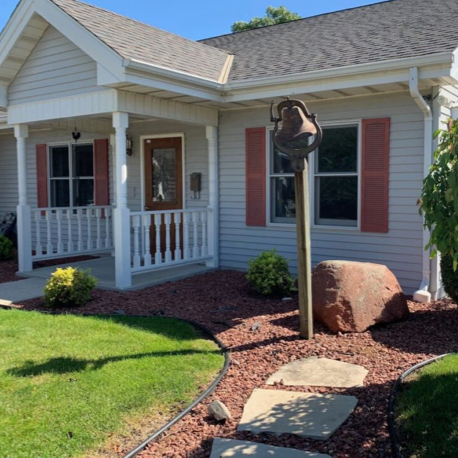Supporting a loved one experiencing cognitive decline is rewarding, but it often involves growing responsibilities.
The progressive nature of cognitive decline means that a person’s physical, cognitive, and emotional needs will change as their symptoms advance. Professional support through memory care helps address these evolving needs with compassionate and personalized care.
Memory care is a specialized form of long-term care for people experiencing varying stages of cognitive decline. It focuses on providing a safe, community-driven environment for residents through activities, therapies, and programs designed to stimulate cognitive function.
Our personalized approach to care at Riverwood Senior Living offers a supportive community that aims to enhance residents’ quality of life.
All About Memory Care
Memory care communities are designed to support people experiencing varying stages of cognitive decline, such as dementia or Alzheimer’s disease.
These conditions are progressive, meaning symptoms worsen over time as cognitive and physical abilities decline. In the early stages of dementia, people may experience mild symptoms like occasional memory lapses or difficulty with decision-making, without compromising their safety and ability to complete daily tasks.
However, as the condition advances, these challenges become more significant and may begin to affect daily activities, communication, and self-care. This progression often leads to increased dependency on others for support and care.
Although families may provide support in the condition’s early stages, the growing complexity of cognitive decline typically requires specialized care and a safe, supportive environment offered in memory care.
Similar to assisted living, memory care prioritizes residents’ safety, health, and wellness by providing round-the-clock professional medical care, physical activity, social activities, and therapies that focus on stimulating cognitive function.
What sets memory apart from other care communities is its emphasis on residents’ safety, with special measures and layouts to prevent wandering, falls, and injuries.
Our staff are experienced, and they’re trained in handling the unique physical, behavioral, cognitive, and emotional needs of people in different stages of dementia. This allows us to provide the necessary support and care for all of our residents.
A Daily in the Life of a Memory Care Resident
Although some of us grow tired of routine, people with cognitive decline find comfort and safety in the predictability of a daily routine.
A day in the life of a memory care resident may differ slightly depending on their overall mood and energy, but it’s relatively similar day by day. Each daily care routine is thoughtfully designed to foster both comfort and engagement as well as encourage overall well-being.
Once our staff member has assisted a resident with their morning personal care routine, the day typically begins with a nourishing breakfast. Here, residents are offered the chance to connect with others while taking the time to enjoy their meal.
Residents then enjoy activities tailored to their interests and abilities, such as art therapy, light exercise classes, or music sessions that stimulate both the mind and body. These planned activities encourage creativity, reduce stress, and foster a sense of accomplishment.
Social engagement is also a key focus in memory care, with opportunities for group interactions and communal gatherings that combat loneliness and cultivate community connections. That’s why our amenities, such as cozy common spaces and outdoor areas, encourage meaningful connections and moments of relaxation.
An evening routine helps combat sundowning by creating a predictable and calming environment. Sundowning is a state of confusion, agitation, or restlessness that often occurs in the late afternoon or early evening in people experiencing dementia or Alzheimer’s. It’s believed to result from a combination of factors, including changes to the body’s internal clock, fatigue from the day’s activities, and reduced sensory input as daylight diminishes.
Activities such as a quiet dinner, listening to soothing music, or engaging in light conversation can provide stability, preventing confusion and anxiety.
Caregivers provide compassionate, personalized support with daily tasks, and work to ensure that every resident feels acknowledged and valued.
Our holistic approach to everyday care offers residents opportunities to thrive emotionally, physically, and socially in a welcoming and supportive community environment.

When is the Right Time for Memory Care?
Contrary to popular belief, there is no exact time or age for transitioning a loved one to memory care. Determining the exact time for memory care can be challenging, as everyone’s needs and progression with dementia are different.
Ultimately, this decision boils down to assessing your loved one’s safety, health, and overall quality of life.
In the early stages of cognitive decline, many people continue to safely live independently, but they can also still benefit from memory care. Our personalized programs, therapies, and activities can help the progression of cognitive decline, helping loved ones preserve their independence.
However, as the condition progresses, certain signs may suggest that your loved one would significantly benefit from the professional support offered in memory care. These signs include:
- Unknowingly putting themselves at risk
- Struggling with daily self-care and cleanliness
- Difficulty communicating with others
- Increasing social withdrawal
- Behavioral changes such as mood swings or aggression
- Experiencing caregiver burnout
The decision to transition to memory care is deeply personal. While there’s no one-size-fits-all approach, the above signs provide a helpful framework.
Memory care can provide specialized attention, tailored routines, and a supportive atmosphere that enhances the quality of life for residents and their families by helping them feel safe, respected, and understood.
Explore Our Memory Care Community
Recognizing how memory care helps support people experiencing cognitive decline can demystify misconceptions about professional care.
Our Riverwood Senior Living community prides itself on the compassionate, welcoming, and supportive care we provide our residents and their families. Our team is dedicated to our residents and their families, helping your loved one transition smoothly into our community.
Connect with us to schedule a tour and see how Riverwood Senior Living can help your loved one lead a safer and more comfortable life.







